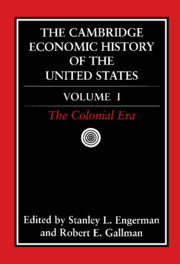Book contents
- Frontmatter
- 1 The History of Native Americans from Before the Arrival of the Europeans and Africans Until the American Civil War
- 2 The African Background to American Colonization
- 3 The European Background
- 4 The Settlement and Growth of the Colonies: Population, Labor, and Economic Development
- 5 The Northern Colonies: Economy and Society, 1600–1775
- 6 Economic and Social Development of the South
- 7 Economic and Social Development of the British West Indies, from Settlement to ca. 1850
- 8 British Mercantilist Policies and the American Colonies
- 9 The Revolution, the Constitution, and the New Nation
- Bibliographical Essays
- References
9 - The Revolution, the Constitution, and the New Nation
Published online by Cambridge University Press: 28 March 2008
- Frontmatter
- 1 The History of Native Americans from Before the Arrival of the Europeans and Africans Until the American Civil War
- 2 The African Background to American Colonization
- 3 The European Background
- 4 The Settlement and Growth of the Colonies: Population, Labor, and Economic Development
- 5 The Northern Colonies: Economy and Society, 1600–1775
- 6 Economic and Social Development of the South
- 7 Economic and Social Development of the British West Indies, from Settlement to ca. 1850
- 8 British Mercantilist Policies and the American Colonies
- 9 The Revolution, the Constitution, and the New Nation
- Bibliographical Essays
- References
Summary
THE REVOLUTION
Although a fundamental economic transformation took place in America only after the Revolutionary and Constitutional periods, many colonists expressed heightened expectations for rapid international and internal development even in the 1750s. Their expectations derived largely from the accelerated pace of economic change in the late colonial years, as well as from the visible signs of material improvement. Although predominantly a rural people, the revolutionary generation experienced aspects of a trans-Atlantic “consumer revolution” affecting the colonial cities and coastal villages before the Imperial Crisis. The aggressive market behavior of importing dry goods merchants connected colonists to British sources of textiles, sewing notions, agricultural implements, glassware, pottery, and other finished goods. By the 1740s, tea, coffee, citrus fruits, sugar and candy, snuff, and smaller quantities of exotic foodstuffs were common in coastal cities. More diverse consumption was made possible by the positive benefits of imperial membership, including naval protection, easy and long credit from British firms, inexpensive British manufactures, and the many unregulated export commodities that could be marketed competitively and without duties. Expanding consumption among “middling” colonists was also made possible by greater agricultural productivity in the mid-Atlantic and Chesapeake regions, as well as by increased staples exportation from southern colonies.
- Type
- Chapter
- Information
- The Cambridge Economic History of the United States , pp. 363 - 402Publisher: Cambridge University PressPrint publication year: 1996
References
- 3
- Cited by



